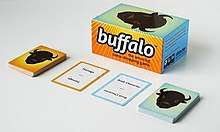Buffalo (card game)
Buffalo is a card game that requires players to think of people or characters who match combinations of descriptions. It was developed by the Tiltfactor Laboratory as part of the National Science Foundation (NSF) funded project called "Transforming Science, Technology, Engineering, and Math (STEM) For Women and Girls: Reworking Stereotypes & Bias."[1][2] The game was runner-up for Best Digital Game in the 2012 Meaningful Play Awards.[3]

Gameplay
In each round, players race to make matches using cards listing noun and adjective descriptors. The first to shout out the name of a real person or fictional character who matches the descriptors on two or more word cards, claims the matched cards, and flips over a new noun/adjective pair. When the deck runs out, the player who collected the most cards wins. Whenever players are unable to make a match, someone adds another card from both decks to the table.[4]
Research
Initial data suggests that Buffalo reduces prejudice and encourages greater inclusiveness in players’ representations of social identity groups.[5][6] The research study showed that thinking about stereotypical and nonstereotypical trait pairings increases social identity complexity, a psychological construct linked to tolerance of members outside one's group.[7]
References
- "Tiltfactor "Pox," "Buffalo," and "Awkward Moment"". Different Games Conference. Archived from the original on 9 November 2013. Retrieved 16 August 2013.
- Barber, Bonnie. "Professor Mary Flanagan Participates in White House Consortium". Dartmouth Now. Archived from the original on 4 September 2013. Retrieved 17 September 2013.
- "2012 Meaningful Play Awards". Meaningful Play 2012. Retrieved 17 September 2013.
- Tan, Phillip. "Friday Games: Tiltfactor's Buffalo". MIT Game Lab. Retrieved 16 August 2013.
- Leigh, Alexander. "How can games contain and convey values?". Gamasutra. Retrieved 16 August 2013.
- "Creating Values from Play - Tiltfactor". Classroom Aid. Retrieved 17 September 2013.
- Recchia, Gabriel. "Can games change minds?". Gamasutra. Retrieved 16 August 2013.
External links
- "buffalo". Tiltfactor.